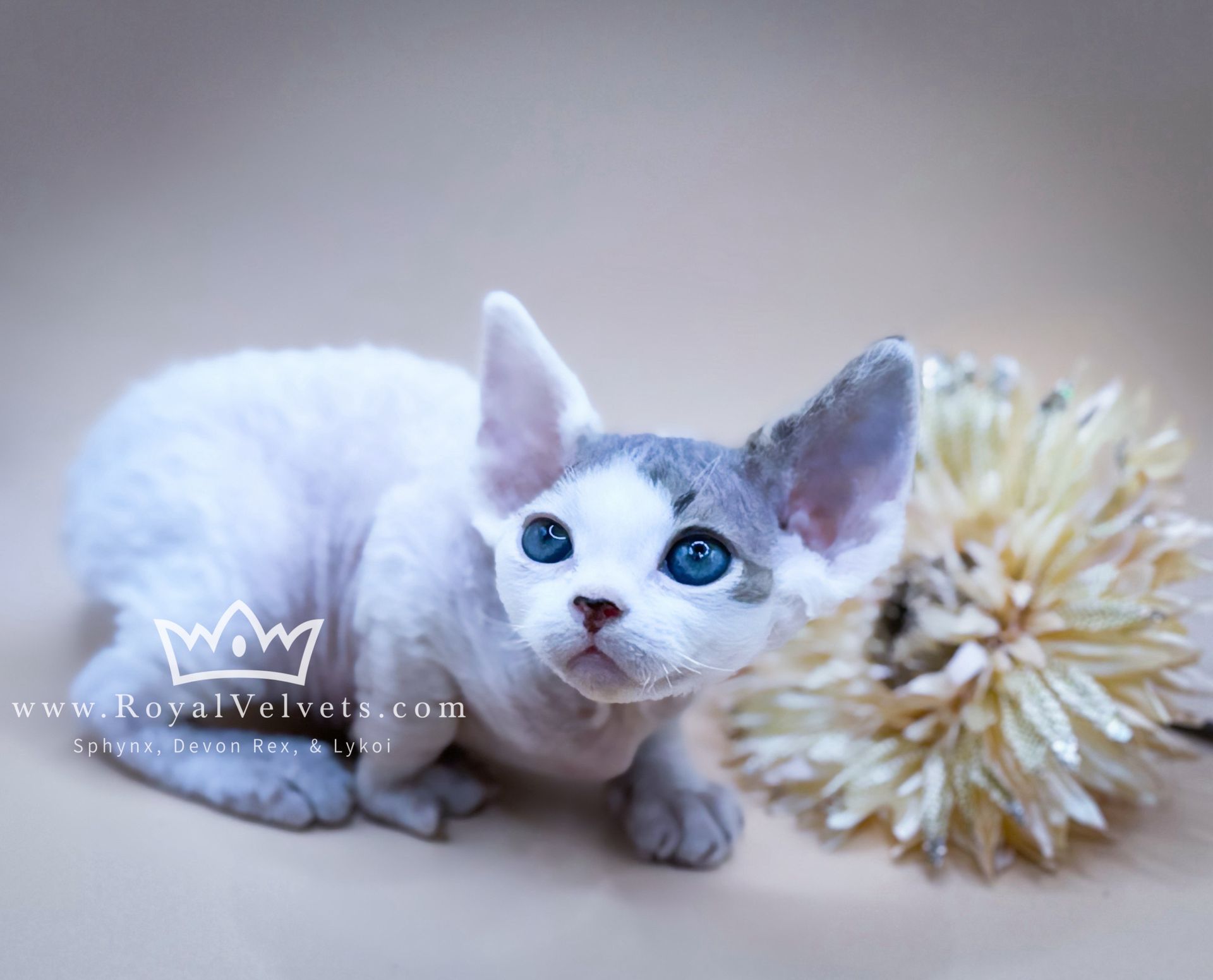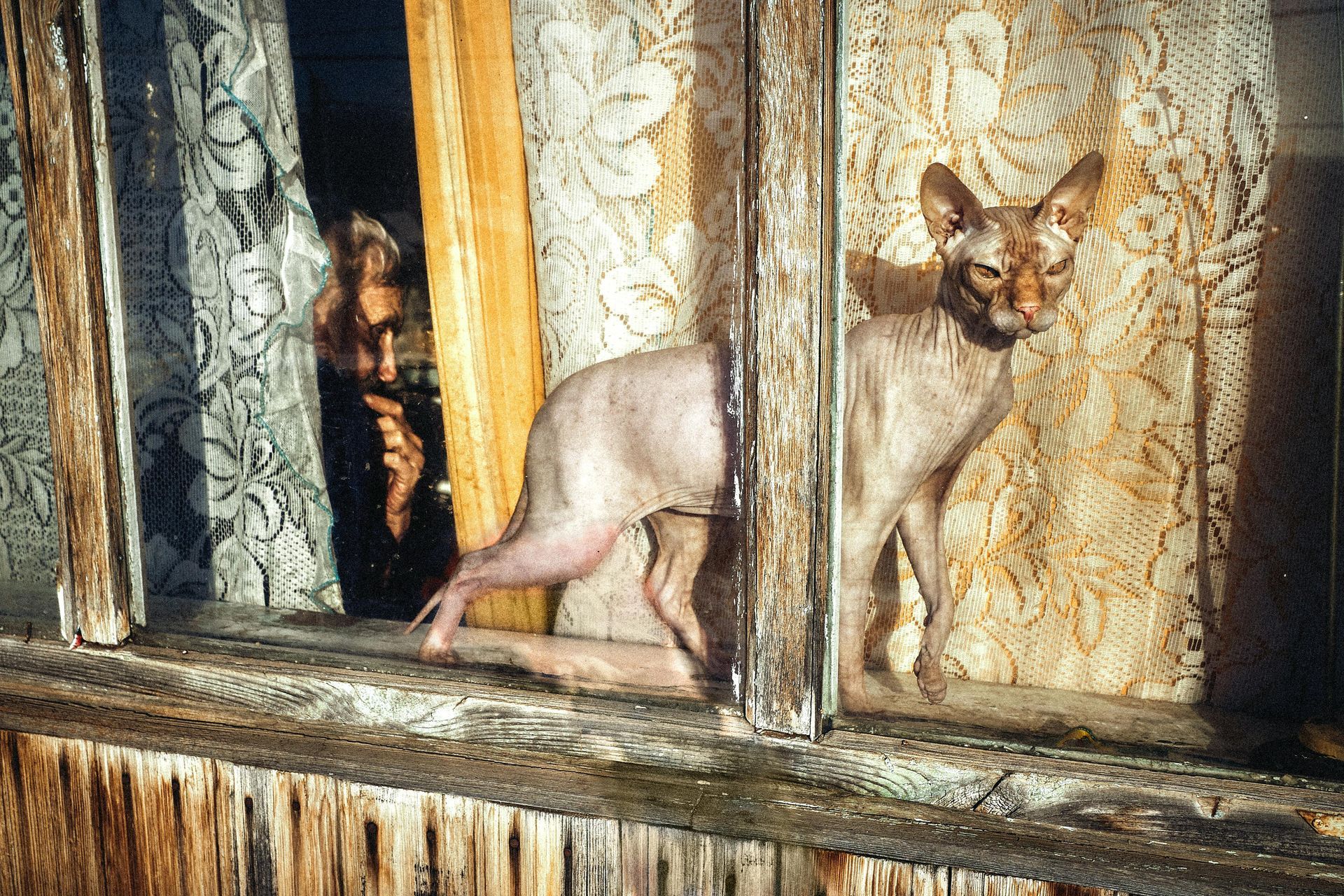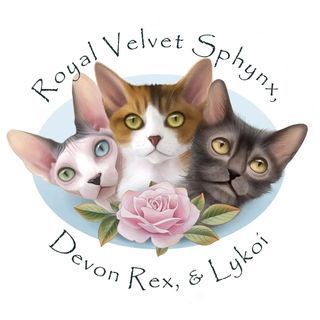In the diverse realm of feline companionship, few breeds captivate as deeply as the Sphynx, Lykoi, and Devon Rex. Each one, a testament to nature's quirks, offers prospective pet owners a unique blend of history, aesthetics, and temperament. However, as with any living being, understanding their nuances is vital before welcoming them into one's home.
The allure of these breeds often lies in their striking appearances and endearing personalities. Yet, there's more than meets the eye. This guide seeks to unravel the mystique surrounding these three cat breeds, providing a well-rounded perspective for those considering one of these delightful felines as their next pet. Whether you're drawn to the near-mystical allure of the Sphynx, the intriguing werewolf-esque features of the Lykoi, or the playful charm of the Devon Rex, a journey of discovery awaits.
Interested in meeting one of these breeds? Browse our available kittens here.
The Enigmatic Sphynx
A silhouette devoid of the typical furry splendor associated with cats, the Sphynx stands out, not just for its absence of a coat, but for its striking features and undeniable charisma. Often mistaken as truly hairless, the Sphynx's skin is akin to soft suede, sometimes dotted with light fuzz, offering a warmth that's delightful to touch.
Origin and History: The Sphynx's journey began in Toronto, Canada, in 1966 when the first hairless kitten, named Prune, was born. This naturally occurring genetic mutation prompted intrigue and the desire to cultivate this unique breed. With careful breeding, the modern Sphynx was born, blending both its unique aesthetics and charming personality.
Physical Attributes: Beyond its hairlessness, the Sphynx is recognized by its muscular physique, large ears that stand like sentinels, and a whip-like tail. Their skin, which comes in a plethora of patterns and colors, often carries wrinkles, particularly around the shoulders, between the ears, and around their expressive, almond-shaped eyes.
Personality: A creature of warmth, both literally and metaphorically, the Sphynx is an outgoing cat, known for its energy and affection. Contrary to its somewhat alien appearance, this breed craves human connection, often following its owner around and seeking out laps for warmth and companionship.
Ideal Living Conditions and Care Considerations: Their lack of a protective coat means the Sphynx requires a different care regimen. Regular baths are essential to remove the oils that accumulate on their skin, and sun protection is a must to prevent sunburn. Their love for warmth might often lead them to bask near windows or snuggle under blankets.
Fascinated by the Sphynx? Learn more about adopting one from our cattery.
Lykoi – The Werewolf Among Cats
If legends of werewolves intrigue you, the Lykoi cat might be the closest feline equivalent. With its unique coat pattern and captivating eyes, the Lykoi exudes an air of mystery and charm.
Origin: The name 'Lykoi' finds its roots in the Greek word for wolves. This breed emerged from a natural mutation in domestic shorthair cats, first documented in 2010 in the USA. While they may seem otherworldly, their genetics are very much terrestrial, with no Sphynx genes despite some similarities in appearance.
Physical Appearance: The Lykoi's signature look arises from a gene that affects hair growth, leaving them with a partially hairless coat that resembles the mythical werewolf. Their fur is patchy, often dense around the face but sparse on the body. This gives them a rugged, wild appearance, complemented by their large, luminous eyes.
Personality: Don't let the wild exterior fool you; the Lykoi is a bundle of affection. They're known for their loyalty and playful nature. Intelligent and with a hint of hunting instinct, Lykois are observant and often form deep bonds with their human companions.
Care Considerations: Despite their rough appearance, Lykois don't require excessive grooming. An occasional brush and bath will suffice. Their skin, however, can be sensitive, making it crucial to ensure they're protected from harsh weather conditions, especially intense sunlight.
Ready to welcome a Lykoi into your home? See our adoption process.
Devon Rex – The Pixie Cat
With a mischievous glint in its eyes and a coat that defies conventions, the Devon Rex is often referred to as the pixie or alien of the feline world. Its playful demeanor and unique appearance make it a beloved breed among cat enthusiasts.
Physical Attributes: The Devon Rex's most notable feature is its curly coat, soft to touch and often compared to waves or ripples. This is paired with large, bat-like ears and a slender physique, giving them their characteristic 'elfish' look. Their eyes, wide and inquisitive, only add to their enchanting presence.
Personality: One could call the Devon Rex the jester of the feline kingdom. Highly playful, energetic, and social, these cats are known to engage in antics that keep their owners entertained. Their loyalty is unparalleled, and it's not rare to find a Devon Rex perched on a shoulder, playing fetch, or even joining you in bed.
Special Care Considerations: The Devon's short, wavy coat sheds less than other breeds but requires occasional grooming to maintain its texture. Being indoor cats, they love warmth and might seek out cozy spots around the house. Their diet should be monitored, as they're known for their voracious appetite and can be prone to obesity.
Thinking of adopting a Devon Rex? Explore our Devon Rex kittens available for adoption.
Comparative Analysis
In the feline world, the Sphynx, Lykoi, and Devon Rex stand out not only for their captivating appearances but also for their distinctive personalities and care needs. Let's unravel the similarities and differences among these three breeds
Appearance
Sphynx: Near hairless with a suede-like feel to the skin.
Lykoi: Partially hairless, presenting a wild, werewolf-like look.
Devon Rex: Soft, wavy, and short coat, paired with large ears, giving them a pixie appearance.
Origins
Sphynx: Originated from a natural mutation in Toronto, Canada, in 1966.
Lykoi: A more recent breed, emerged from a natural mutation in the USA around 2010.
Devon Rex: Discovered in the UK during the 1950s, they share no relation to the Cornish Rex despite similarities.
Personality Traits
Sphynx: Outgoing, warm, and extremely affectionate.
Lykoi: Loyal, observant, and forms deep bonds with humans.
Devon Rex: Playful jester of the feline world, loyal and social.
Care Considerations
Sphynx: Requires regular baths, sun protection, and seeks warmth.
Lykoi: Low maintenance but needs protection from harsh weather.
Devon Rex: Occasional grooming and a monitored diet.
Each of these breeds offers a unique experience, and the choice often boils down to an individual's preferences, living conditions, and the kind of feline companionship they seek.
Need guidance choosing the right breed for your home? Contact our team for personalized advice or view our frequently asked questions.
Conclusion
The tapestry of the feline kingdom is rich and varied, with breeds like the Sphynx, Lykoi, and Devon Rex offering a mesmerizing blend of history, appearance, and temperament. While their aesthetics might be the initial draw, it's their unique personalities and care considerations that truly set them apart.
For prospective cat owners, understanding these nuances is paramount. Whether you're drawn by the warmth of the Sphynx, the wild charm of the Lykoi, or the playful antics of the Devon Rex, it's essential to recognize that each breed offers a distinct companionship experience. Armed with this knowledge, one can embark on a fulfilling journey with their feline friend, ensuring a relationship marked by understanding, care, and mutual affection.
In the end, the joy of pet ownership is not just in the breed but in the bond forged over shared moments, laughter, and the simple pleasure of a purring companion by your side.
Ready to embark on the feline journey?
Reach out to us today and let's find your perfect match!


